
READING LIST\

Stillness Flowing
By Ajahn Jayasaro
Currently Reading
This important work details the life and teachings of Luang Por Chah, also known as Ajahn Chah, and has been in the making for over two decades.
Favourite Quotes
.
Lesson
.

The Four Noble Truths
By Ajahn Sumedho
Read
At the centre of Buddhist belief we find The Four Noble Truths. This book is dedicated to understanding the basics of them and how they are to be interpreted and used in daily practice.
Favourite Quotes
But that is not the First Noble Truth; it is not: 'I am suffering and I want to end it.' The insight is, 'There is suffering'. Now you are looking at the pain or the anguish you feel - not from the perspective of 'It's mine' but as a reflection. P.15
The insight is simply the acknowledgement that there is suffering without making it personal. P.15
The second insight then, is that dukkha is something to understand. One should understand dukkha, not just try to get rid of it. P.15
So you listen to it with bare attention, not saying it's good or bad, but merely recognising it for what it is. P.56
We can look at the word 'understanding' as 'standing under'. It is a common enough word but, in Pali, 'understanding' means to really accept the suffering, stand under or embrace it rather than just react to it. P.15
This is the Third Noble Truth which we must realise for ourselves. We contemplate cessation. We say 'There is cessation', and we know when something has ceased. P.75
Start putting yourself in the position of knowing: 'I know this is dukkha; there is dukkha.' P.43
...the way out of suffering isn't through getting out of our human experience by living in refined conscious states, but by embracing the totality of all the human and Brahma realms through mindfulness. P.117
...we don't use wisdom to suppress sensitivity. We don't dominate our emotions by thinking and by suppressing our emotional nature. This is what we have tended to do in the West; we've used our rational thoughts and ideals to dominate and suppress our emotions, and thus become insensitive to things, to life and to ourselves. P.116
If we have never really studied or tried to understand what it is to feel life, and really opened and allowed ourselves to be sensitive, then emotional things are very frightening and embarrassing to us. We don't know what they are all about because we have rejected that side of ourselves. P.110
When we find that we are suffering, physically or mentally, then we go to the actual suffering that is present. We open completely to it, welcome it, concentrate on it, allowing it to be what it is. That means we must be patient and bear with the unpleasantness of a particular condition. We have to endure boredom, despair, doubt and fear in order to understand that they cease rather than running away from them. P.77
We get caught in that movement of striving to become happy, seeking to become wealthy; or we might attempt to make our life feel important by endeavoring to make the world right. So note this sense of wanting to become something other than what you are right now. P.51
Meditation is a commitment to wise investigation. P.73
With mindfulness, we are willing to bear with the whole of life; the pleasure and the pain, the fascination and the weariness, the beginning and the ending, the birth and the death. P.42
So the way is always working with the moments of daily life. P.57
The whole aim of the Buddhist teaching is to develop the reflective mind in order to let go of delusions. P.67
These insights can only come through reflection; they cannot come through belief. P.67
insight is really gut knowledge - it's not just from ideas... It is really known - and doubt is no longer a problem. P.93
It takes a willingness to actually look at your own reactions, to be able to see the attachments and to contemplate: 'What does attachment feel like?' P.69
just the moment that you refuse to indulge in that feeling is an enlightenment experience P.57/58
Well-being is just knowing things as they are without feeling the necessity to pass judgement upon them. P.60
We begin to feel that we want to live in a way that is a blessing to the planet. P.105
Lesson
.

The Good Immigrant
By Nikesh Shukla
Read
Bringing together 21 exciting black, Asian and minority ethnic voices emerging in Britain today, The Good Immigrant explores why immigrants come to the UK, why they stay and what it means to be ‘other’ in a country that doesn’t seem to want you, doesn’t truly accept you – however many generations you’ve been here – but still needs you for its diversity monitoring forms.
Favourite Quotes
It is there in the white men and women who do not understand, to the point of frustration, why we still walk with the noose of our ancestors around our necks, as we cannot comprehend how they do not carry the indignity of their ancestors tying it there. P.26
We're not seen as human, because we never get to be complex individuals. Our defining characteristic is generally our forgiveness. P.95
Working toward a day when sex would no longer be about power, about stealing something from someone else, but instead about shared joy. P.124
I have come to notice that whenever children are asked to write a story in school, children of colour will write a story featuring characters with 'traditional' English names who speak English as a first language. P.97
The problem is that, when one of these conventions is that children in stories are white, English and middle-class, then you may come to learn that your own life does not qualify as subject material. P.99
This keeps us in our place, humans bickering, focusing on their differences, distracted, and at each other's throats, competing and separating - Divide and rule. P.183
My dada is a proud, self-taught businessman who likes to pamper his grandkids, using the gains from a lifetime of hard work to create a cushion from the harshness of the world that he never had. P.215
Lesson
.

The Invisible Doctrine: The Secret History of Neoliberalism (& How It Came to Control Your Life)
By George Monbiot & Peter Hutchison
Read II
We live under an ideology that preys on every aspect of our lives: our education and our jobs; our healthcare and our leisure; our relationships and our mental wellbeing; the planet we inhabit – the very air we breathe. So pervasive has it become that, for most people, it has no name. It seems unavoidable, like a natural law.
Favourite Quotes
‘Boom, Bust, Quit’ is what capitalism does. The ecological crises it causes, the social crises it causes, the productivity crises it causes are not perverse outcomes of the system. They are the system. P.
Capitalism is an economic system founded on colonial looting. P.
Our predicament, the greatest humanity has ever faced, is often characterised as a climate crisis. But it would be more accurate to call it an Earth systems crisis. P.
What we are witnessing is the breakdown, at astonishing speed, of our life support systems- driven by capitalism, accelerated by neoliberalism. P.
What is neoliberalism? It’s an ideology whose central belief is that competition is the defining feature of humankind. It tells us that we are greedy and selfish, but that greed and selfishness light the path to social improvement, generating the wealth that will enrich us all. It casts us as consumers rather than citizens. P.
Neoliberalism has often been imposed on people during great crises: at moments when they were too distracted to resist- or even notice- the new policies that governments were slipping under their doors. P.
...there is no natural law that dictates the rich should run the world. Their dominance is sustained only by our collective fear and our failure of political imagination. P.
Just as there is a poverty line below which no one should fall, she argues that there is a wealth line above which no one should rise. P.
By failing to match their solutions to the scale of the problems, they treat us like idiots — and we know it. P.
Across most of the progressive spectrum, a timid reluctance to articulate what we really want, and the mistaken belief that people aren't ready to hear anything more challenging, condemns us to failure. P.
Only a demand for system change, directly confronting the powers driving us to societal despair and planetary destruction, has the potential to address the scale of our problems. Only a big ask — a very big one — will inspire and mobilise the millions of people required to transform our political and economic system. P.
There was never time for incrementalism. Far from being a shortcut to the change we want to see, it's the morass into which ambition sinks. System change, as the neoliberals and new demagogues have proven, is and has always been the only fast and effective means of transformation. P.
But we need to act where and how we can, to create, wherever possible, pools of resistance and examples of change that can inspire and mobilise our better values: altruism, empathy, community, family, and the pursuit of a more just and equitable world. Values to which most people subscribe, regardless of political or religious affiliation. P.
The most important question that humanity has ever faced is whether we can reach the social tipping points before we reach the environmental tipping points. P.
If we are to reach these social tipping points, our first task is to tear down the cloak of invisibility that shields both neoliberalism and the true nature of capitalism from public view. It is to expose their breaches, their obscurities, and their deceptions. It is to reveal what has been hidden. It is to speak their names. P.
Lesson
.

Rules for Revolutionaries: How Big Organizing Can Change Everything
By Becky Bond & Zack Exley
Read
Fast-paced, provocative, and profound, Rules for Revolutionaries stands as a liberating challenge to the low expectations and small thinking that dominates too many advocacy, non-profit, and campaigning organizations and points the way forward to a future where political revolution is truly possible.
Favourite Quotes
.
Lesson
.

Out of the Wreckage
By George Monbiot
Read
A toxic ideology rules the world – of extreme competition and individualism. It misrepresents human nature, destroying hope and common purpose. Only a positive vision can replace it, a new story that re-engages people in politics and lights a path to a better world.
Favourite Quotes
The phrase ‘It’s not true that’ carries less weight than the familiar narrative to which it is attached. A string of facts, however well attested, has no power to correct or dislodge a powerful story... The only thing that can displace a story is a story. P.8
Competition and individualism are the values at the heart of the twenty-first
century’s secular religion. Everywhere we are encouraged to fight for wealth and social position like stray dogs over a dustbin. P.21
Without a new, guiding story of their own, allowing them to look towards a better future rather than a better past, it was inevitable that political parties which once sought to resist the power of corporations and the very rich would lose their sense of direction. P.41
The streets were once our commons, where children played and adults talked. But cars have occupied the space that people used for other purposes, drowned out conversation and – through noise, pollution and stress – driven us indoors. P.52
We spend hours every day watching other people doing what we might otherwise be doing: dancing, singing, playing sport, even cooking. What television tells us is that life is somewhere other than where we are. It encourages us to connect not with those around us, but with celebrities whom we will never meet, whose lives we are induced to believe we share. P.53
All these trends reinforce the dominant story of our times: that we are governed by self-interest and driven by the desire to outcompete those around us... we have arranged society in such a way that they come to the fore. P.55
If ecosystems or political systems deteriorate, younger people, who know nothing else, regard that degraded state as normal and unexceptional – and so it continues. P.58
Holiday and airline companies have worked hard to persuade us that living the dream means travelling the world, seeking novel experiences. But I suspect that what many people want above all else is a strong sense of home: to be embedded in a thriving and caring community. P.64
While people might take pride in a job that attracts high social status but causes tremendous harm to others, in this case, you can attach your pride and sense of purpose to something indisputably beneficial. Building community is a noble calling. P.74
Unless we are also engaged nationally and globally, our communities are at constant risk of destruction and dispersal. P.75
...the revived community can become a source of strength on which we can build our wider movements. It is a lived example of the world we want to create. P.75
To most people, who are not economists or politicians or journalists, the state of the living planet features as a real but remote concern, dimly perceived through the gauze of daily life. P.92
To be an environmentalist, to see what others refuse to see, is to struggle every day against hostility, denial and, above all, indifference. It is to find yourself fighting almost everyone in a position of power. It is to find yourself locked in a constant cycle of determination and despair. P.93
For this ingenious rubbish... we have exchanged a world of natural wonders: coral reefs and ice sheets, rainforests and wetlands, whales and rhinos, bees and birdsong, streams and meadows, and all the tiny marvels whose loss is seldom recorded. For this junk, we have reduced our chances of survival. P.95
Economic growth... depends on the expansion of demand for pointless goods and services... To succeed, we must destroy ourselves P.96
refuting a dominant frame serves only to reinforce it. To displace it, we must create a new one. P.96
It turns out that treating the living planet, the core economy, the commons, energy, materials, and most of the world’s people as white space on the map, then praying for the divine intervention of the invisible hand and hoping for the best, does not succeed. Who knew? P.100
Excluded from decision-making, we are reduced to passive recipients of whatever distorted account the media chooses to produce. Everything, across the entire term of office, is justified by reference to a single decision made on a single day. A finegrained democratic control over the decisions affecting our lives is denied to us. P.117
‘far more people are willing to step up if you ask them to do something big to win something big than … if you asked them to do something small to win something small’. P.131
The idea of a march followed by speeches is not inherently a bad one, as long as its purposes are kept in sight at every moment: to inspire, to inform, and then to direct the crowd to action, by which I mean a specific task rather than a vague call to ‘rise up’. P.136
Most people are socially minded, empathetic and altruistic. They would prefer to live in a world in which everyone is treated with respect and decency... But a small handful, using lies and distractions and confusion, stifle this latent desire for change. P.140
When we emerge from the age of loneliness and alienation, from an obsession with competition and extreme individualism, from the worship of image and celebrity and power and wealth, we will find a person waiting for us. It is a person better than we might have imagined, whose real character has been suppressed. It is the one who lives inside us, who has been there all along. P.144
Lesson
.

Be The Change
By Trenna Cormack
Read
Be uplifted by the stories of 28 pioneers, social entrepreneurs, activists and campaigners working in many fields - including the media, education, health, peace, finance, business and the environment. In exclusive interviews, individuals working on all scales - from global and national to local and grassroots levels - tell us how and why they are bringing positive change. They share the challenges and the joys, and show that a brighter future is not only possible, it's already emerging.
Favourite Quotes
.
Lesson
Connecting with the human experience of others as they step into sometimes unfamiliar and unexpected positions of trying to create positive change during this time of crisis.
Witnessing the empowerment and boldness while simply reading about the couragous acts of others.
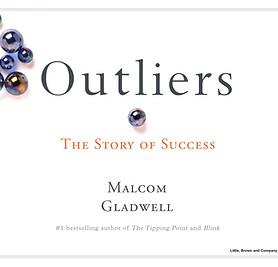
Outliers
By Malcolm Gladwell
Read
In this provocative and inspiring book, Malcolm Gladwell looks at everyone from rock stars to professional athletes, software billionaires to scientific geniuses, to show that the story of success is far more surprising, and far more fascinating, than we could ever have imagined.
He reveals that it's as much about where we're from and what we do, as who we are - and that no one, not even a genius, ever makes it alone.
Favourite Quotes
When and where you are born, what your parents did for a living, and what the circumstances of your upbringing were make a significant difference in how well you do in the world. P.175-76
Lesson
Learning how much of what leads to 'success' is shaped by many happenstance circumstances that are out of our control like being given the opportunity to work more than others (10,000 hours rule). Hard work and determination is key but seemingly don't play as big a role in shaping the likelihood of 'success'.
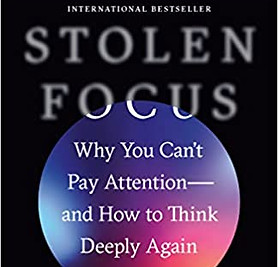
Stolen Focus
By Johann Hari
Read
We think our inability to focus is a personal failure to exert enough willpower over our devices. The truth is even more disturbing: our focus has been stolen by powerful external forces that have left us uniquely vulnerable to corporations determined to raid our attention for profit.
Favourite Quotes
.
Lesson
.
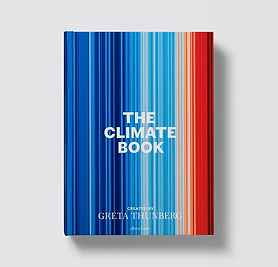
The Climate Book
By Greta Thunberg
Paused
Greta Thunberg has gathered the wisdom of over one hundred experts - geophysicists, oceanographers and meteorologists; engineers, economists and mathematicians; historians, philosophers and indigenous leaders - to equip us all with the knowledge we need to combat climate disaster. Alongside them, she shares her own stories of demonstrating and uncovering greenwashing around the world, revealing how much we have been kept in the dark. This is one of our biggest challenges, she shows, but also our greatest source of hope. Once we are given the full picture, how can we not act? And if a schoolchild's strike could ignite a global protest, what could we do collectively if we tried?
We are alive at the most decisive time in the history of humanity. Together, we can do the seemingly impossible. But it has to be us, and it has to be now.
Favourite Quotes
.
Lesson
.

Manufacturing Consent: The Political Economy of the Mass Media
By Edward S. Herman & Noam Chomsky
Paused
Contrary to the usual image of the press as cantankerous, obstinate, and ubiquitous in its search for truth, Edward Herman and Noam Chomsky depict how an underlying elite consensus largely structures all facets of the news. What emerges from this groundbreaking work is an account of just how propagandistic our mass media are, and how we can learn to read them and see their function in a radically new way.
Favourite Quotes
.
Lesson
.

Essays And Aphorisms
By Arthur Schopenhauer
Read
These pieces depict humanity as locked in a struggle beyond good and evil, and each individual absolutely free within a Godless world, in which art, morality and self-awareness are our only salvation. This innovative - and pessimistic - view has proved powerfully influential upon philosophy and art, directly affecting the work of Nietzsche, Wittgenstein and Wagner among others.
Favourite Quotes
"The world we perceive is characterized by great diversity, but this diversity is not fundamental; fundamentally the world is a unity... Thus we find at the very beginning of philosophy the assertion that there exist two worlds, the 'real' and the 'apparent', that everything is 'really' something else and not what it 'appears' to be." P.12
"In his best recorded moments Schopenhauer understands more vividly than anyone the suffering involved in life and the need felt by all created things for love and sympathy." P.34
"Just as we are conscious not of the healthiness of our whole body but only the little place where the shoe pinches, so we think not of the totality of our successful activities but of some insignificant trifle or other which continues to vex us." P.41
"The most effective consolation in every misfortune and every affliction is to observe others who are more unfortunate than we: and everyone can do this." P.42
"The happiness of a given life is not to be measured according to the joys and pleasures it contains but according to the absence of the positive element, the absence of suffering." P.43
"If the act of procreation were neither the outcome of a desire nor accompanied by feelings of pleasure, but a matter to be decided on the basis of purely rational considerations, is it likely the human race would still exist? Would each of us not rather have felt so much pity for the coming generations as to prefer to spare it the burden of existence, or at least not wish to take it upon himself to impose that burden upon it in cold blood?" P.47
"From this point of view one might consider that the appropriate form of address between man and man ought to be, not monsieur, sir, but fellow sufferer, compagnon de miseres. However strange this may sound it corresponds to the nature of the case, makes us see other men in a true light and reminds us of what are the most necessary of all things: tolerance, patience, forbearance and charity, which each of us needs and which each of us therefore owes." P.50
"To our amazement we suddenly exist, after having for countless millennia not existed; in a short while we will again not exist, also for countless millennia." P.51
"
Lesson
.
.png)
This Is Vegan Propoganda (And Other Lies The Meat Industry Tells You)
By Ed Winters
Read
Whether you are a vegan already or curious to learn more, this book will show you the other side of the story that has been hidden for far too long. Based on years of research and conversations with slaughterhouse workers and farmers, to animal rights philosophers, environmentalists and everyday consumers, vegan educator and public speaker Ed Winters will give you the knowledge to understand the true scale and enormity of the issues at stake.
Favourite Quotes
"As consumers we have the right to know what we are paying for, and as active participants in the exploitation of animals we also have a moral obligation to confront the truth about the choices we make." P.5
"People often call vegans extremists, and yet veganism is merely living by the principle that if I am against cruelty then I will do what I can to avoid perpetuating systems that cause physical and mental harm to animals. It is a clear indictment of how ingrained our state of cognitive dissonance is that we see attempts at moral consistency as signs of extremism. Is it not strange that we call those who kill dogs animal abusers, those who kill pigs normal and those who kill neither extremists?" P.15
"The real problem is our mentality, a mentality that judges some lives to be less important because of the pleasure we get from consuming their flesh or wearing their skin. We have allowed our physical and intellectual capabilities to make us tyrants over every other species on this planet. I have heard it said before that to the animals we are the devils of this planet and this world is their hell, a place of subjugation and pain. I can't see any rational reason why this isn't the case." P.20
"The reality is there is no such thing as happy exploitation, happy mutilations or happy forced impregnations. And there is no such thing as a happy farm animal, as abuse and exploitation is an inherent and fundamental part of what we do to animals, regardless of how they are farmed... These labels may make us feel better as consumers, but every animal will still one day meet the knife hanging in the slaughterhouse." P.48
"About half of all the beef consumed comes from the dairy industry. So while I did not realise it at the time, replacing meat with halloumi when I went vegetarian wasn't stopping cows from being slaughtered. The truth is, the dairy industry is very much the meat industry, just with added years of cruelty before the cows reach the slaughterhouse." P.67
"As a society, we condemn people who kill animals. If someone stabbed a dog, we would presume that they were either mentally unwell or an evil person. However, we expect people who spend upwards of 60 hours a week repetitively stabbing chickens, pigs, cows and lambs to hang up their bloody aprons at the end of the day and then just integrate back into normal society. The emotional burden of doing the work that almost nobody else wants to do because of its violent nature and doing it because you feel you have no other choice and are therefore trapped must inevitably lead to desensitization, repression and anger for many." P.92
"It is ironic that so many films and TV shows for kids feature the animals that we farm and kill by the billions. Peppa Pig is a well-known example, as is Shaun The Sheep, both beloved by children. Parents would be understandably outraged if Peppa was forced into a gas chamber in one episode or Shaun had his throat cut. And yet most parents are paying for these things to happen to real animals and feeding them to their children, who probably aren't even aware that the sausages they had for dinner came from a pig." P.189
"As children, our views of animals are very different to those we have as we grow older. Children don't evaluate the lives of animals based on what they can do for us or what we can take from them; instead, they values them simply because of their existence." P.189
"We all live by values given to us by the societies and cultures that we were raised in, reinforced by our parents and peers, and rationalised and defended by our cognitive biases. However, society has always progressed because we have challenged the dominant paradigms and ingrained norms. The stagnation of progress comes from apathy, complacency and the refusal to critically reflect. We often look back through humanity's short history in disbelief at the way that we have acted in the past. Future generations will do the same when they reflect on the actions of our contemporary society unless we do the work that is required to shed our past transgressions. That work is still ongoing and in many regards is just beginning." P.261
Lesson
.

Mortality
By Christopher Hitchens
Read
In this eloquent confrontation with mortality, Hitchens returns a human face to a disease that has become a contemporary cipher of suffering.
Favourite Quote
"You feel swamped with passivity and impotence: dissolving in powerlessness like a sugar lump in water."
"I feel my personality and identity dissolving as I contemplate dead hands and the loss of the transmission belts that connect me to writing and thinking."
Lesson
Impermanence. The things many of us are attached to fade away and change. Letting go.
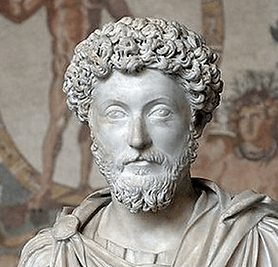
Meditations
By Marcus Aurelius
Read
With a profound understanding of human behavior, Marcus provides insights, wisdom, and practical guidance on everything from living in the world to coping with adversity to interacting with others.
Favourite Quote
"Just that you do the right thing. The rest doesn't matter."
Lesson
.
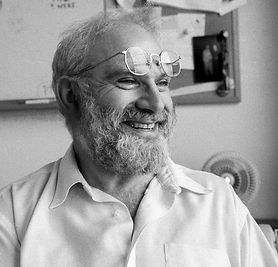
The Man Who Mistook His Wife for a Hat
By Oliver Sacks
Read
The Man Who Mistook His Wife for a Hat and Other Clinical Tales is a 1985 book by neurologist Oliver Sacks describing the case histories of some of his patients.
Favourite Quote
"A final, humorous point. Where Dr P. might mistake his wife for a hat Macrae's patient, also unable to recognise his wife, needed her to identify herself by a visual marker, by '... a conspicuous article of clothing, such as a large hat'."
Lessons
The complexity of the human mind, its ability to unconsciously control vital functions, and what occurs when these unseen neurological abilities are affected.
A greater understanding and ability to perceive what it is like for those living with neurological disorders.

War and Peace
By Leo Tolstoy
Read
The aim of war is murder, the methods of war are spying, treachery, the ruin of a country's inhabitants... and he who kills the most people receives the highest rewards.
Favourite Quote
"Rostov stood at that corner for a long time, watching the feast from a distance. In his mind, a painful process was going on which he could not bring to a conclusion. Terrible doubts rose in his soul. Now he remembered Denisov with his changed expression, his submission, and the whole hospital, with arms and legs torn off and its dirt and disease. So vividly did he recall that hospital stench of dead flesh that he looked round to see where the smell came from. Next he thought of that self-satisfied Bonaparte, with his small white hand, who was now an Emperor, liked and respected by Alexander. Then why those severed arms and legs and those dead men?... Then again he thought of Lazarev rewarded and Denisov punished and unpardoned. He caught himself harboring such strange thoughts that he was frightened."
Lesson
.

Tribe: On Homecoming and Belonging
By Sebastian Junger
Read
TRIBE explains why we are stronger when we come together, and how that can be achieved even in today's divided world.
Favourite Quote
"The findings are in keeping with something called self-determination theory, which holds that human beings need three basic things in order to be content: they need to feel competent at what they do; they need to feel authentic in their lives; and they need to feel connected to others. These values are considered “intrinsic” to human happiness and far outweigh “extrinsic” values such as beauty, money, and status"
Lesson
.

Brave New World
By Aldous Huxley
Read
Discover the brave new world of Aldous Huxley's classic novel, written in 1932, which prophesied a society that expects maximum pleasure and accepts complete surveillance - no matter what the cost.
Favourite Quote
"...most men and women will grow up to love their servitude and will never dream of revolution."
Lesson
.

Long Walk To Freedom: The Autobiography of Nelson Mandela
By Nelson Mandela
Read
The riveting memoirs of the outstanding moral and political leader of our time, A Long Walk to Freedom brilliantly re-creates the drama of the experiences that helped shape Nelson Mandela's destiny. Emotive, compelling and uplifting, A Long Walk to Freedom is the exhilarating story of an epic life; a story of hardship, resilience and ultimate triumph told with the clarity and eloquence of a born leader.
Favourite Quote
"No one is born hating another person because of the color of his skin, or his background, or his religion. People must learn to hate, and if they can learn to hate, they can be taught to love, for love comes more naturally to the human heart than its opposite."
Lesson
.

Punished by Rewards: The Trouble with Gold Stars, Incentive Plans, A's, Praise, and Other Bribes
By Alfie Kohn
Currently Reading
The basic strategy we use for raising children, teaching students, and managing workers can be summarised in six words: Do this and you'll get that. Drawing on a wealth of psychological research, Alfie Kohn points the way to a more successful strategy based on working with people instead of doing things to them. "Do rewards motivate people?" asks Kohn. "Yes. They motivate people to get rewards."
Favourite Quotes
.
Lesson
.

The Shoulders We Stand On
By Preeti Dhillon
Read
Have you heard of the Indian Workers' Association? The Grunwick Strike? The Brixton Black Women's Group? The Battle of Brick Lane? If the answer is no, you're not alone. The Shoulders We Stand On tells the stories of ten remarkable movements, campaigns and organisations led by Black and Brown people across Britain from the sixties to the eighties that fought against racism and capitalism and impacted the way we live now.
Favourite Quotes
We've complained to the police about the police and nothing has been done. We've complained to judges about judges and nothing's been done. We've complained to magistrates about magistrates and nothing's been done. We've complained to the council about the council and nothing has been done. Now we have to do something ourselves. P.104
The law is like other tools of control, it is not neutral, and sometimes it must be bent or broken in order to highlight its biases and faults. It is person-made, or, let's face it, largely white man-made, and we must always ask ourselves: whose interests are served by this law? P.325
It doesn't really matter who's in power as they will operate within the same norms. Both, all, parties are just wolves sharing each other's sheep outfits. That we think otherwise is one of the greatest illusions we've been fed by the media and the state since 1981. P.321
Perhaps most chillingly I have learned that the biggest perpetrator of racism in the UK was not the National Front member on the street, but actually the state. From elected politicians, to laws (especially immigration laws), to the police force, healthcare and even the education system, the state was the biggest perpetrator and supporter of racism. Not to be outdone, it was followed closely by the media. P.317
Quite simply, people were pissed off, tired, and fast running out of options to express themselves. P.307
A pool of Chaggar's blood still lay on the ground close to the Dominion Cinema the following morning as twenty-two-year-old Suresh Grover walked by. A police officer stood next to the blood. Grover asked the police officer what had happened. 'It was just an Asian' was the reply. Just an Asian. P.256
Awareness raising, consciousness building and education were among the Black Panthers' and other Black Power groups' main activities, and some of the least publicised by the media, which instead liked to focus on protests and run-ins with the police. P.95
Judge Clarke warned the jury to disregard everything they had heard about racial discrimination in general (like Howe's closing statement) and advised them to 'keep your cool and concentrate on the evidence you have heard.' P.118
Politicians and police officials alike constantly expressed their surprise at what was happening, which you can only imagine was some very willful cognitive dissonance and not pure ignorance. P.307
Those academics in the academic Ivory Towers were trying to quantify the unquantifiable: they were trying to pin down the long, looping, elusive tendrils of racism that grew around school structures and influenced the behaviour of teachers and the lives of the students. P.162
Until the lions have their own historians, the history of the hunt will always glorify the hunter
African proverb
P.172
Overpopulation is an imperialist straw man often used to justify family-planning initiatives in the Global South while falling birth rates in Europe and Japan are met with alarm P.196
So community solidarity has been prised apart, would-be critics have been co-opted, and participation in the broken system has been sold as the solution. P.321
The focus was always on the bigger picture. The structures and policies that allowed this to keep happening time and time again. P.324
They looked at the world through an intersectional lens... able to see how issues affected people differently depending on the multiple identities they held. P.197
Armed with this understanding I am better able to make sense of society, to place events in their rightful context. P.317
And now the bread and butter of racism is the systemic, institutional racism that permeates our lives through policy, legislation and cultural norms. It leads to tragedies like Grenfell, rampant Islamophobia, stripping British citizens of their citizenship, deaths in police custody and unequal treatment in the healthcare system, to name just a few manifestations. P.6
Thanks to the actions of Black and Brown people, bussing was stopped, virginity testing was exposed, innocent people walked free, and neo-Nazis were ousted from neighbourhoods. Families were housed, children were actually educated, workplaces were forced to change discriminatory practices and lives were saved from premature ending through covert political control. Thanks to those who fought in the 1960s to 1980s, the UK we live in today is better than it was in many ways. P.318
Lesson
.

Undivided: The Quest for Racial Solidarity in an American Church
By Hahrie Han
Read
In 2016, even as Ohio helped deliver victory to presidential candidate Donald Trump, Cincinnati voters also passed a ballot initiative for universal preschool. The margin was so large that many who elected Trump must have—paradoxically—also voted for the initiative: how could the same citizens support such philosophically disparate aims? What had convinced residents of this Midwestern, Rust Belt community to raise their own taxes to provide early childhood education focused on the poorest—and mostly Black—communities?
Favourite Quotes
The true impact of Undivided was not as a prejudice reduction program, but rather as a learning experience that inspired action... People needed those friendships and groups to cultivate and sustain the courage to act. P.225
Racism could operate without racists when the unspoken social mores of a community did the work for them. P.74
The word radical actually comes from the idea of being rooted. Change is radical not when it is extreme, but when it makes change from the roots up. P.239
In many evangelical megachurches, small groups like the Justice Team were the place where congregants pushed one another to be the kind of people they wanted to be but were scared to become. P.144
If the individuals strike out on isolated journeys of antiracism, but allow the families, workplaces, faith institutions, social groups, and neighborhoods they inhabit to sustain the status quo, change always remains fragile. P.161
In a society plagued by disinformation and distrust, researchers found that nothing was more effective than personal experience in pushing people to see old things with new eyes. But they often needed others to make meaning of what they saw. P.224
People were forced to reexamine who they were, what they believed, what they must do because of what they believed - and what they were willing to risk. P.238
Systems as complex as racism in America do not change when disconnected people without any roots in a community yell a little louder or reshuffle a few priorities. Instead, it changes when people rooted in their own interests and connected to one another organize themselves into just structures that enable them to put their hands on the complex levers of change. P.239
Lesson
.
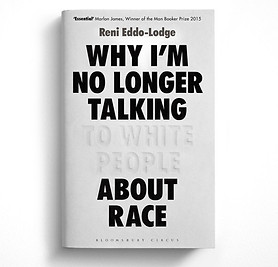
Why I'm No Longer Talking To White People About Race
By Reni Eddo-Lodge
Read
Exploring everything from eradicated black history to the inextricable link between class and race, Why I'm No Longer Talking to White People About Race is the essential handbook for anyone who wants to understand race relations in Britain today.
Favourite Quotes
Not seeing race does little to deconstruct racist structures or materially improve the conditions which people of colour are subject to daily. In order to dismantle unjust, racist structures, we must see race. We must see who benefits from their race, who is disproportionately impacted by negative stereotypes about their race, and to who power and privilege is bestowed upon – earned or not – because of their race, their class, and their gender. Seeing race is essential to changing the system. P.84
How can I define white privilege? It’s so difficult to describe an absence. And white privilege is an absence of the negative consequences of racism. An absence of structural discrimination, an absence of your race being viewed as a problem first and foremost, an absence of ‘less likely to succeed because of my race’. P.86
But white privilege is the fact that if you’re white, your race will almost certainly positively impact your life’s trajectory in some way. And you probably won’t even notice it. P.87
Pretending that everything is fine helps no one. P.111
For a long time now, far-right political groups have hijacked the anti-colonial struggles of native people in America and Australia to create a story of the embattled indigenous white British, under siege from immigration. P.120
If Katie Hopkins, with help from the Sun newspaper, publishes a column describing desperate refugees trying to travel to Britain as cockroaches, then we need a cultural commentator that advocates for true compassion and total open borders. Not the kind of wishy-washy liberalism that harps on about the cultural and economic contributions of migrants to this country as though they are resources to be sucked dry, but someone who speaks in favour of migrants and open borders with the same force of will with which Hopkins despises them. P.134
The Rhodes Must Fall campaign was not calling for Rhodes to be erased from history. Instead they were questioning whether he should be so overtly celebrated. P.131
Rhodes Must Fall was a small-scale example of what racial injustice looks like in Britain. It looks normal. It is pedestrian. It is unquestioned. It’s just a part of the landscape, you might walk past it every day. P.132
White people are so used to seeing a reflection of themselves in all representations of humanity at all times, that they only notice it when it’s taken away from them. P.140
‘I think white people get defensive when you call them white,’ she tells me over Skype, ‘because they’ve internalised a message that goes it’s rude to point out somebody else’s race. P.111
But proclaiming post-racial success was a way to bury any discussion of racism – to insist that we had actually pressed fast forward, and everything was ok now. P.213
There is no point in keeping quiet because you want to be liked. Often, there will be no one fighting your corner but yourself. It was black feminist poet Audre Lorde who said: ‘your silence will not protect you.’ Who wins when we don’t speak? Not us. P.187
Attacking racist frame, form, functions and codes with no words to describe them can make you feel like you are the only one who sees the problem. We need to see racism as structural in order to see its insidiousness. We need to see how it seeps, like a noxious gas, into everything. P.222
Lesson
.

Who Rules the World?
By Noam Chomsky
Paused
Chomsky shines a powerful light on this inconvenient truth. With climate change and nuclear proliferation threatening the survival of our civilization, the message has never been more pertinent or more urgent: the need for an engaged and active public to steer the world away from disaster grows ever greater.
Favourite Quotes
Since we can scarcely see what is happening before our eyes, it is not surprising that events at a slight distance are utterly invisible. P.15
Today's Republicans, meanwhile, have moved so far right in their dedication to the wealthy and the corporate sector that they cannot hope to get votes on their actual programs. Instead, they have turned to mobilizing sectors of the population that have always been there, just not an organized political force: evangelicals, nativists, and the victims of the forms of globalization designed to set working people around the world in competition with one another while protecting the privileged. P.265
The terminology is accurate enough, according to the rules of Anglo-American discourse, which defines "the world" as the political class in Washington and London (and whoever happens to agree with them on specific matters). P.22
If, for a moment, we can adopt the perspective of the world, we might ask which criminals are "wanted the world over." P.30
Lesson
.
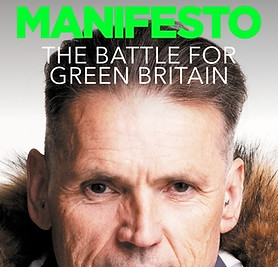
Manifesto
By Dale Vince
Read
This is the story of a man whose unwavering journey to save the environment has driven him all the way to the top, and a powerful manifesto for anyone who wants to change the world. Dale Vince has led a remarkable life. From ‘enemy of the state’ to ‘green energy tycoon’, he has dedicated his life to challenging conventional wisdom in pursuit of a better way to live.
Favourite Quotes
It's a mistake to judge an idea only by what's possible today or what has already been done. P.54
What we eat is more important than where it comes from. Way less than 1 per cent of the carbon impact of food is from food miles. It's not something to stress over. P.189
We actually need to emancipate animals. I know that's a big ask right now, but one day it won't look so. P.190
Imagine rewilding half the landmass of our country.
Our food choice can do this. P.192
Governments need to tackle demand for animal products too. It's based on habit and false marketing. P.190
We spend £3 billion a year in Britain on subsidies to make this food artificially cheap. P.194
Renewable energy by contrast is universally available, it occurs in all parts of the world. It won't ever run out, not while our sun lasts, so forever in this case means a few billion years. It is in all respects abundant - an endless supply, everywhere. We don't have to compete or fight for it, and we don't need global markets setting the price of it. Renewable energy can democratise energy. P.192/193
Literally millions of tonnes of sewage have been dumped into our rivers and seas because it's cheaper for the companies that run our water monopolies. Privatisation is a three-decade experiment with no success stories. P.206
Scientists reckoned July 2023 was the Earth's hottest month in 120,000 years. P.215
it's a single-use fuel and it runs out... where's the security in that? P.223
Lesson
.

80,000 Hours
By Benjamin Todd
Read
You have about 80,000 hours in your career: 40 hours a week, 50 weeks a year, for 40 years. This means your choice of career is one of the most important decisions you’ll ever make.
Make the right choices, and you can help solve some of the world’s most pressing problems, as well as have a more rewarding, interesting life.
Favourite Quotes
"advocacy is neglected. This is because there's usually no commercial incentive to spread socially important ideas. Instead, advocacy is mainly pursued by the small number of people willing to dedicate their careers to making the world a better place." P.60
"Taking a stable job and doing advocacy part-time can be effective because you don't need to worry about funding your advocacy, which helps you to stay independent and take bigger risks." P.61
"the most effective approach for you will be one which is a good fit with your skills and motivation." P.70
"you can have a greater lifetime impact by first investing in yourself... to build [flexible] career capital." P.79
"Knowing the downside makes it less scary, and having a back-up plan makes it more likely you'll cope." P.111
"Not changing course when a better option exists is one of the most common decision-making mistakes identified by psychologists and is called 'sunk cost fallacy' or 'status quo bias'." P.112
"If you can prove that you'll get the results the employer most values, everything else is much less important." P.121
"Many people fill up their CVs with everything they've done, but it's usually better to pick one or two most impressive achievements and focus on those. It sounds better, it makes it more likely you'll cover it, and it makes it more likely your audience will remember it." P.124
"Many studies have shown that writing down when you'll do a task makes it more likely you'll actually do it - it's called an 'implementation intention'. P.128
"The basics are getting enough sleep, exercising, eating right and maintaining your closest friendships." P.144
"If you're suffering from a mental health issue... make dealing with it or learning to cope your top priority. It is one of the best investments you can ever make both for your own sake and your ability to help others." P.145
"Try to develop habits that will let you build connections automatically." P.149
"Often the quickest way to learn a skill is just to do it, while getting feedback from experts." P.152
"the availability heuristic, causing us to focus on options that are readily available; anchoring, a tendency to overweight the first piece of information given; status quo bias, an irrational preference for the current state of affairs; and the sunk cost fallacy, the tendency to assign more weight to options we've already invested time and effort into." P.157
"You need to be able to identify when your preference for a certain career is for good reason, and when it's just because of past commitments." P.158
"having engaging work that absorbs your attention, working with people you like, the job meeting your basic needs (with regards to salary, working hours, etc.) and it fitting with the rest of your life." P.162
"You'll learn fastest in jobs where you receive good mentorship." P.165
Lesson
.

What Happened to You?
By Bruce D. Perry & Oprah Winfrey
Read
In conversation throughout the book, the two focus on understanding people, behaviour, and ourselves in the context of personal experiences. They remove blame and self-shaming, and open up a space for healing and understanding. It’s a subtle but profound shift in our approach to trauma, and it’s one that allows us to understand our pasts in order to clear a path to our future – opening the door to resilience and healing in a proven, powerful way.
Favourite Quotes
"The long-term impact of being whupped - then forced to hush and even smile about it - turned me into a world - class people pleaser for most of my life. It would not have taken me half a lifetime to learn to set boundaries and say 'no' with confidence had I been nurtured differently." P.12
Lesson
.

How We Win
By George Lakey
Read
A lifetime of activist experience from a civil rights legend informs this playbook for building and conducting nonviolent direct action campaigns
In an era of massive worldwide protests for racial and economic justice, it is important to remember that marching is only one way to take to the streets. Protest must be supplemented with the sustained direct action campaigns that are crucial to winning major reforms.
Favourite Quotes
“In order to build the kind of power that creates change, we needed a direct action campaign that harnessed a series of actions into an escalating sequence. The typical protest is organizationally hollow, unsustainable, and not really a problem for a strong opponent, which above all fears our staying power.” P.5
“I know of no country that has undergone major change through one-off protests. Opponents realize that no matter how many people participate in sporadic protests, participants will go home again. Winning major demands requires staying power, as this guide will share, much else besides.” P.6
“Nonviolent campaigns know exactly what they want.” P.6
“Campaigners also know who can make the decision they need. Alice Paul led the National Woman’s party direct action campaign for suffrage and targeted President Woodrow Wilson.” P.7
“American mass media offer almost no information about how nonviolent campaigns win or what their strategic choices are. Media may show dramatic actions, but it reveals very little context. We learn nothing…
The result is not surprising. We’re left with a public that is ill-informed on what its options are when facing an authoritarian president or a wave of policy changes that diminish human rights and well-being and planetary sustainability.” P.9
“Campaigns that used nonviolent direct action had twice the success rate of struggles that used violence.” P.10
“Heat creates volatility, in metal and in society… it makes possible something new to replace the rigid oppressive structures.” P.16
Build a movement of movements powerful enough to dislodge the 1 percent from dominance. That’s what the Swedes and Norwegians did. Movements cooperated because they saw that their individual goals were opposed by the same force - the economic elite.” P.19
“More people are motivated to go with you if they know where you’re going.” P.21
“Fighting defensively [e.g. hanging on to previously achieved gains] will not lead you to victory against a determined opponent… ‘the best defense is an offense.’” P.22
“Setting new goals for life enhancement and then fighting vigorously for them.” [the offensive] P.24
“If we don’t create space for people to show up honestly, the eventual backlash in the group would be severe.” P.30
“The quickest way to accelerate people’s growth is by reinforcing positive behaviours…
I could have started attacking Jim for his perspective. But I figured my ally role was to help him grow. I asked him where he got that idea.” P.33
“As the campaign grew with a series of creative direct actions, it created a political power center uncontrolled by any party politician. This is generally intolerable for politicians since their art is indeed the art of wielding and controlling power…
The result was the politicians actually approached the Caino-Free campaigners and asked how they could be helpful.” P.52
“You can have the most elegantly pointed demand in the world, but if it cannot move people to care, it is not the right one.” P.57
“The truth is that many - probably most - campaigns win through allies stepping up and neutral parties changing into allies. Opponents who see themselves getting isolated may be tempted at that point to make concessions.” P.79
“The FBI head in the 1960s, J. Edgar Hoover, called Dr. Martin Luther King, Jr., ‘the most dangerous man in America.’ And those who ruled to British Empire considered Gandhi their biggest threat to the wealth flowing into Britain from the colonies.” P.94
“The best actions are those that reveal the truth.” P.97
“It was shocking for them to see nicely dressed black college students reading their textbooks while sitting at a lunch counter waiting for coffee, when they could get takeout coffee at the back door. Doubly shocking to see white men beating them up. Two secrets we exposed at once: black people want freedom, and segregation requires violence.” P.97
“Millions of slogans on picket signs could not do what a simple sit-in could do. Campaigns have power when we get beyond words - when we show rather than tell.” P.97
“Action logic is showing rather than telling… the action immediately makes sense.” P.101
“That’s one challenge: activists share more news about the latest awful thing than we do about how creative people are making change.” P.103
“Effectiveness depends more often on drama than on sheer numbers…
So another problem is we emphasize numbers over drama.” P.104
“Human beings grow through going beyond their comfort zones and, with appropriate support and safeguards, trying new behaviours.” P.116
“Being honest and vulnerable helps other people to step up.” P.126
“The videos of the police brutality electrified the nation, woke up uncounted potential allies who until then had been asleep, and energized the movement…
‘The paradox of repression’ is what sociologists call this dynamic. It happens when the brutality intended to stop a movement instead gives it energy and strength.” P.137
“Use your bodies intentionally… when in doubt, sit down… The activists sitting on the ground created the largest possible contrast, and it is this contrasting behaviour that frames the activists positively in the eyes of the next segment of the spectrum of allies.” P.141
Just as taught in martial arts, nonviolent campaigners use the force of the other side to our advantage.” P.151
“Civil disobedience was central: by the time of their victory suffragist Julia Emory had been arrested 34 times… In jail, they often refused to work and went on hunger strikes.” P.157
“People are aware that they cannot continue in the same old way but are immobolized because they cannot imagine an alternative. We need a vision that recognizes that we are at one of the great turning points in human history when the survival of our planet and the restoration of our humanity require a great sea change in our ecological, economic, political, and spiritual values.” P.179
“Activists thought if they simply described vividly enough how terrible climate change is, or how unjust racism or sexism or poverty is, masses of people would reorder their priorities and join them. That’s not the way it works… where are you going?” P.179
“My hope is that you, if you are not already acting boldly, will experience the joy and empowerment I have found by my decision to act in history rather than watch it go by. P.185
Lesson
.

Why We Can't Wait
By Martin Luther King Jr.
Read Twice
Martin Luther King, Jr. recounts the pivotal events in the city of Birmingham, Alabama in 1963 that propelled his non-violent campaign for racial justice from a movement of lunch counter sit-ins and prayer meetings to a phenomenon that 'rocked the richest, most powerful nation to its foundations'.
Favourite Quotes
"Nonviolent direct action seeks to create such a crisis and foster such a tension that a community which has constantly refused to negotiate is forced to confront the issue. It seeks so to dramatize the issue that it can no longer be ignored.” P.89
"Just as a doctor will occasionally reopen a wound, because a dangerous infection hovers beneath the half-healed surface, the revolution for human rights is opening up unhealthy areas in American life and permitting a new and wholesome healing to take place.” P.181
“Injustice must be exposed, with all the tension its exposure creates, to the light of human conscience and the air of national opinion before it can be cured.” P.97
“Injustice must be rooted out by strong, persistent and determined action.” P.101
“Like his predecessors, the Negro was willing to risk martyrdom in order to move and stir the social conscience of his community and the nation. Instead of submitting to surreptitious cruelty in thousands of dark jail cells and on countless shadowed street corners, he would force his oppressor to commit his brutality openly - in the light of day - with the rest of the world looking on.” P.34
“The purpose of our direct-action program is to create a situation so crisis-packed that it will inevitably open the door to negotiation… Too long has our beloved Southland been bogged down in a tragic effort to live in monologue rather than dialogue.” P.90
“A nonviolent army has a magnificent universal quality.” P.35
“The real issue is whether in the great mass the dominant characteristics are decency, honor and courage.” P.43
“Direct action is not a substitute for work in the courts and the halls of government. Bringing about passage of a new and broad law by a city council, state legislature or the Congress, or pleading cases before the courts of the land, does not eliminate the necessity for bringing about the mass dramatization of injustice in front of a city hall. Indeed, direct action and legal action complement one another; when skillfully employed, each becomes more effective.” P.40
“Each of us expected that setbacks would be part of the ongoing effort. There is no tactical theory so neat that a revolutionary struggle for a share of power can be won merely by pressing a row of buttons. Human beings with all their faults and strengths constitute the mechanism of a social movement. They must make mistakes and learn from them, make more mistakes and learn anew. They must taste defeat as well as success, and discover how to live with each. Time and action are our teachers.” P.41
“In the mind of the average man, there was little cause for concern.” P.5
“Certainly Birmingham has its decent white citizens who privately deplored the maltreatment of Negroes. But they remained publicly silent. It was silence born of fear - fear of social, political and economic reprisals. The ultimate tragedy of Birmingham was not the brutality of the bad people, but the silence of the good people.” P.51
“We will have to repent in this generation not merely for the hateful words and actions of the bad people but for the appalling silence of the good people.” P.98
“I have almost reached the regrettable conclusion that the Negro’s great stumbling block in his stride toward freedom is not the White Citizens’ Counciler or the Ku Klux Klanner, but the white moderate, who is more devoted to “order” than to justice; who prefers a negative peace which is the absence of tension to a positive peace which is the presence of justice; who constantly says: “I agree with you in the goal you seek, but I cannot agree with your methods of direct action”; who paternalistically believes he can set the timetable for another man’s freedom; who lives by a mythical concept of time and who constantly advises the Negro to wait for a “more convenient season.” Shallow understanding from people of good will is more frustrating than absolute misunderstanding from people of ill will. Lukewarm acceptance is much more bewildering than outright rejection.” P.96
“We proved to them that we needed no weapons - not so much as a toothpick. We proved that we possessed the most formidable weapon of all - the conviction that we were right. We had the protection of our knowledge that we were more concerned about realizing our righteous aims than about saving our skins.” P.67
“In fact, virtually all the coverage in the national press at first had been negative, picturing us as irresponsible hotheads who had plunged into a situation just when Birmingham was getting ready to change overnight into Paradise.” P.71-72
“My friends, I must say to you that we have not made a single gain in civil rights without determined legal and nonviolent pressure. Lamentably, it is an historical fact that privileged groups seldom give up their privileges voluntarily.” P.90
“The words and actions of parliaments and statesmen, of kings and prime ministers, movie stars and athletes, were shifted away from the front pages to make room for the history-making deeds of the servants, the drivers, the elevator operators and ministers.” P.8-9
“We were not anarchists advocating lawlessness, but that it was obvious to us that the courts of Alabama had misused the judicial process in order to perpetuate injustice and segregation. Consequently, we could not, in good conscience, obey their findings.” P.78
“It is unfortunate that demonstrations are taking place in Birmingham, but it is even more unfortunate that the city’s white power structure left the Negro community with no alternative.” P.87
“The Negro minority will unite for political action for the same reason that it will seek to function in alliance with other groups - because in this way it can compel the majority to listen.” P.179
"The enemy the Negro faced became not the individual who had oppressed him but the evil system which permitted that individual to do so." P.35
"So the question is not whether we will be extremists, but what kind of extremists we will be. Will we be extremists for hate or for love?" P.101
"The unforgivable default of our society has been its failure to apprehend the assassins. It is a harsh judgement, but undeniably true, that the cause of the indifference was the identity of the victims." P.172
Lesson
We can be taught to hate, oppress, and feel superior to others, and thus we can learn to love, practice compassion, and understand that there is no hierarchy of moral worth.
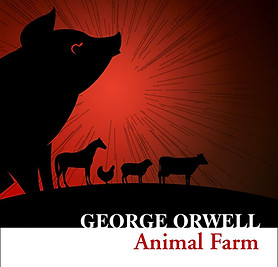
Animal Farm
By George Orwell
Read
All animals are equal but some animals are more equal than others’
The animals at Manor Farm have had enough of Farmer Jones – he’s drunk, reckless and cares little for their welfare. When the boar, Old Major, shares his revolutionary plans, the animals are convinced they can thrive on their own once the despot Jones is overthrown. But as the pigs vie for power, they begin to bear an uncanny resemblance to the tyrants they have overthrown…
Favourite Quote
"in spite of everything - in spite of their terror of the dogs, and of the habit, developed through long years of never complaining, never criticising, no matter what happened - they might have uttered some word of protest. But at that moment, as though at a signal, all the sheep burst out into a tremendous bleating..." P.89
Lesson
An oppressive regime involves controlling the ignorant through dictating the flow of information, censorship, deception and gradually implementing practices that benefit those in power who do not have the public in their best interest.
Blind obedience is dangerous: "Napoleon is always right!"

Getting Relationships Right: How to Build Resilience and Thrive in Life, Love, and Work
By Melanie Joy, PhD
Read
Drawing on the most relevant research as well as on her own extensive experience as a psychologist, Joy explains how to strengthen your “relational immune system” to resist not only interpersonal stressors but also largely invisible yet potentially devastating societal stressors like racism and sexism. With this understanding, you can cultivate relationships that consistently reflect core moral values and honor the dignity of everyone involved. Resilient relationships are a source of joy and fulfillment for those who are in them—and they also support the thriving of the organizations and communities of which we all are a part.
Favourite Quotes
Most psychological and spiritual traditions teach that integrity is a barometer of psychological health and emotional maturity and that increasing integrity is a fundamental goal of human development. P.43
Lesson
.

The Art Of Happiness
By His Holiness The Dalai Lama & Howard C. Cuttler. MD.
Read
Through conversations, stories, and meditations, the Dalai Lama shows us how to defeat day-to-day anxiety, insecurity, anger, and discouragement. Together with Dr. Cutler, he explores many facets of everyday life, including relationships, loss, and the pursuit of wealth, to illustrate how to ride through life's obstacles on a deep and abiding source of inner peace.
Favourite Quote
"One begins by identifying those factors which lead to happiness and those factors which lead to suffering. Having done this, one then sets about gradually eliminating those factors which lead to suffering and cultivating those which lead to happiness. That is the way."
"Whether we are feeling happy or unhappy at any given moment often has very little do with our absolute conditions but, rather it is a function of how we perceive our situation, how satisfied we are with what we have."
"We can increase our feeling of life satisfaction by comparing ourselves to those who are less fortunate than us by reflecting on all the things we have."
"If you possess this inner quality, a calmness of mind... then even if you lack various external facilities that you would normally consider necessary for happiness, it is still possible to live a happy and joyful life."
"The demarcation between a positive and a negative desire or action is not whether it gives you a(n) immediate feeling of satisfaction but whether it ultimately results in positive or negative consequences."
"The true antidote of greed is contentment. If you have a strong sense of contentment, it doesn't matter whether you obtain the object or not, either way, you are still content."
"But there is a better approach: framing any decision we face by asking ourselves, 'Will it bring me happiness?' That simple question can be a powerful tool in helping us skilfully conduct all areas of our lives... it puts a new slant on things... shifts the focus from what we are denying ourselves to what we are seeking - ultimate happiness."
"The proper utilization of our intelligence and knowledge is to effect changes from within to develop a good heart."
"If you approach others with the thought of compassion, that will automatically reduce fear and allow openness with other people. It creates a positive and friendly atmosphere."
Lesson
Understanding the importance of reflecting and acting on what truly brings happiness. This brings awareness to what is important by setting the intention and is especially helpful when the mind seeks short-term pleasure that can lead to unskillful habits.

Free Will
By Sam Harris
Read
It is difficult to think about law, politics, religion, public policy, intimate relationships, morality—as well as feelings of remorse or personal achievement—without first imagining that every person is the true source of his or her thoughts and actions. And yet the facts tell us that free will is an illusion.
Favourite Quote
"Free will is an illusion. Our wills are simply not our own making. Thoughts and intentions emerge from background causes of which we are unaware and over which we exert no conscious control."
"The intention to do one thing and not another does not originate in consciousness - rather it appears in consciousness, as does any thought or impulse that might oppose it."
"Some moments before you are aware of what you will do next... your brain has already determined what you will do. You then become conscious of this "decision" and believe that you are in the process of making it."
"You are not in control of your mind - because you, as a conscious agent, are only part of your mind, living at the mercy of other parts. You can do what you decide to do - but you cannot decide what you will decide to do."
"I think that losing the sense of free will has only improved my ethics - by increasing my feelings of compassion and forgiveness, and diminishing my sense of entitlement to the fruits of my own good luck."
Lesson
Melanie Joy's description puts it best: "expecting any of us should be different from who and how we are at any given moment is like expecting a tree that's been rained on not to be wet."
An understanding of the "calibrated clockwork" of humans, and that we act from things that aren't within our control. Acting upon the desire to try and live wholesomely was ultimately set out from conditions and mental formations out of one's control. This has sparked a more compassionate and forgiving perspective on the actions of beings and oneself.
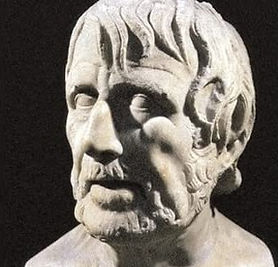
Letters from a Stoic: Epistulae Morales Ad Lucilium
By Seneca
Read
Seneca was the guiding hand of the Roman Empire. This selection of Seneca's letters shows him upholding the ideals of Stoicism - the wisdom of the self-possessed person immune to life's setbacks.
Favourite Quote
"How much better to pursue a straight course and eventually reach that destination where the things that are pleasant and the things that are honourable finally become, for you, the same."
Lesson
Actionable pieces of wisdom that still apply to this day.

Hidden: Animals in the Anthropocene
By Jo-Anne McArthur
Read
HIDDEN shines a light on the invisible animals in our lives: those with whom we have a close relationship and yet fail to see. The animals we eat and wear; the animals we use for research, work, and for entertainment; the animals we sacrifice in the name of tradition and religion. HIDDEN is a historical document, a memorial, and an indictment of what is and should never again be.
Favourite Quote
"When the suffering of another creature causes you to feel pain, do not submit to the initial desire to flee from the suffering one, but on the contrary, come closer, as close as you can to him who suffers, and try to help him." - Leo Tolstoy
Lesson
The hidden made visible. An unrelenting document revealing the horrors of the modern world from the perspective of non-human animals. A book that connects with your innate compassion and makes you want to reach through and just help those that are suffering.

The Alchemist
By Paulo Coelho
Read
Santiago, a young shepherd living in the hills of Andalucia, feels that there is more to life than his humble home and his flock. One day he finds the courage to follow his dreams into distant lands, each step galvanised by the knowledge that he is following the right path: his own. The people he meets along the way, the things he sees and the wisdom he learns are life-changing.
Favourite Quote
"The secret is here in the present. If you
pay attention to the present, you can improve upon it. And, if you improve
on the present, what comes later will also be better."
Lesson
.
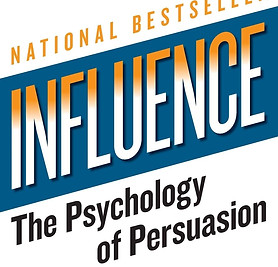
Influence: The Psychology of Persuasion
By Robert Cialdini
Read
You’ll learn the six universal principles of influence and how to use them to become a skilled persuader—and, just as importantly, how to defend yourself against dishonest influence attempts.
Favourite Quote
"When we are uncertain, we are willing to place an enormous amount of trust in the collective knowledge of the crowd... frequently the crowd is mistaken because they are not acting on the basis of any superior information but are reacting, themselves, to the principle of social proof."
Lesson
.

Animal Liberation
By Peter Singer
Read
How should we treat non-human animals? In this immensely powerful and influential book, the renowned moral philosopher Peter Singer addresses this simple question with trenchant, dispassionate reasoning. Accompanied by the disturbing evidence of factory farms and laboratories, his answers triggered the birth of the animal rights movement.
Favourite Quote
"It is an implication of this principle of equality that our concern for others and our readiness to consider their interests ought not to depend on what they are like or on what abilities they may possess... But the basic element—the taking into account of the interests of the being, whatever those interests may be—must, according to the principle of equality, be extended to all beings, black or white, masculine or feminine, human or nonhuman."
Lesson
.

Spirit Matters
By Michael Lerner
Currently Reading
Spirit Matters shows how deeply we've been hurt personally, emotionally, ecologically, and politically by living in a world that systematically represses our spiritual needs-and how we might create a personal life and society that embodies what Michael Lerner describes as an Emancipatory Spirituality.
The time is now to stop compromising with a world whose fundamentals are so far from our own highest values and begin to create the world we privately tell ourselves we really believe in.
Favourite Quotes
.
Lesson
.
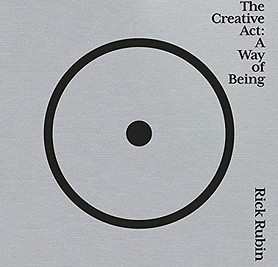
The Creative Act
By Rick Rubin
Read
A beautiful and generous course of study that illuminates the path of the artist as a road we all can follow. It distils the wisdom gleaned from a lifetime's work into a luminous reading experience that puts the power to create moments - and lifetimes - of exhilaration and transcendence within closer reach for all of us.
Favourite Quotes
.
Lesson
.
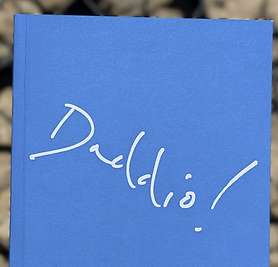
Daddio! A Collaborative Novel
By Alex Lockwood
Read
A man drives his elderly evil-tempered father to a funeral. They never arrive as their dysfunctional family dynamic unravels on a journey overshadowed by a fascist & climate-ravaged future. Daddio! is a portrayal of the crisis in democracy, climate, & truth, a parable for our times – but don’t worry, it’s a comedy!
Favourite Quotes
"I remember Julian's words clearly, indeed gongingly, that all of us, especially artists, need to "live in the times we're in" rather than continue to make art or write books that don't try, at least, to come to terms with the times." P.121
"If this work is a work of collaborative labour, then it is a model for the work we will have to do together now and into the future, for the world that is coming to us, whether we want it or not." P.126
"Could I reveal to her the real things that scared her: not brown people, not iffy untruths about stolen elections, but the older, more banal and universal harms buried deep down, of a frightened Inner Child... It was these real unhealed traumas that kept her grasping for a float in the shape of a TV remote, anything to keep her above the waterline, a fastened thing to grab to; but in doing so, she was having her blowholes of anxiety exploited and redirected by the Alt-Govt and MediaFash towards more fruitful (for them) targets (and didn't they know it.)" P.103
"Yet that was the MediaFash's greatest success, wasn't it, at the behest of Corruption Capitalism, to coerce people into thinking that their traumas came from the Unknown Other out there, and not from fears much, much closer to home." P.104
"These stories they made up, my sister and my dad, were attempts to make sense of an unsafe world. Something certain they could go by, even if it not true. But at least the story was theirs. It couldn't be challenged, not really (another Trumplandism, I noted). It was, for all intents and purpose, a reliable history. A story that they could depend on when all other stories fell away. And once they'd repeated it enough times, it became theirs, became them. It didn't matter if it was based on a lie. A lie will do, as long as it tells us who we are. Which is, in the end, perhaps all they ever wanted. To know who they were." P.105
"I understood, then, that it was not my job to go digging for wells or worms; if she wanted to do her own digging, then that was down to her, as mine had been down to me; rather, I was to play my part in building whatever relationship we could in the present (whatever present we were given) on whatever ground was under us." P.107
Lesson
.

How to Survive a Plague: The Story of How Activists and Scientists Tamed AIDS
By David France
Read
A social and scientific history of AIDS, and the grass-roots movement of activists, many of them facing their own life-or-death struggles, who grabbed the reins of scientific research to help develop the drugs that turned HIV from a mostly fatal infection to a manageable disease.
Favourite Quotes
This was true of many gay men and women, whether in the closet or out, because nobody who was out hadn't first spent many years in. You hid from the people who knew you best; you were a character actor so convincing your own mother was fooled. P.93
I was no longer the man who hid and lied to myself and to others, always alert to the potential for physical violence. Now I walked and talked in a way that was natural for me. P121
A national poll that fall found that more than a third of Americans had changed their opinions about the community for the worse since the onset of AIDS. The Los Angeles Times reported that the community's political heyday was over, when in truth what the community tumbled from was already the bottom rung. P.201
Most in attendance were middle-class liberals who had never taken a public stand for their rights. P.202
'Many of us had to live a lie too long,' he began. 'We spent agonizing years believing lies about ourselves, hideous lies that fed self-hate, that ate away at us until we feared that any minute we would be destroyed' P.202
There is no place for journalistic filth like that in any sane society. P.204
The collective slanders against the community still continued from the highest levels, but now the perpetrators had to contend with the response of GLAAD'S nettlesome foot soldiers. P.218
I'm also tired of people coming up to me on the street and saying, 'Thank you for what you're doing and saying.' They mean it as a compliment, I know. But now I scream back, 'Why aren't you doing it and saying it, too? Why are there so few people out there screaming and yelling? You're dying too!... Yes, most of all, I'm tired of you. P.271
They had formed an affinity group called Testing the Limits, a video collective committed to making documentary films and other creative responses to the crisis. P.323
From the start of the FDA campaign, it was decided to pursue a kind of good cop/bad cop approach with the agency. Barr would lead the good cop team, reasonably presenting the grievances to officials and demanding full and unconditional compliance with the Watkins Commission recommendations, while Bordowitz's strategy would be to menace the agency with news about the upcoming march on a regular basis. The implication was that an invasion of unruly activists could be avoided if the FDA capitulated. P.325
[After the Wall Street protests] The following Monday, admitting to being pinioned by protesters, Burroughs Wellcome slashed the price of AZT for a second time, finally reaching the price range demanded by ACT UP. It took another seven months for the criminal trespass case to come to a head. A judge, ruling that the defendants had acted 'in the interests of justice,' dismissed all charges. P.382
On the battlefield, one cannot step over so many bodies without imagining one's own lifeless cheek on the ground. P.434
Hughes, in the same state, had no tolerance for anyone who could go about her ordinary life in the middle of such devastation. P.480
Lesson
.
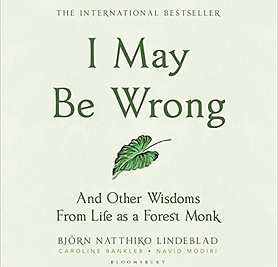
I May Be Wrong
By Björn Natthiko Lindeblad
Read
Infusing the everyday with heart, grace and gentle humour, this is a book to help us all navigate the realities of modern life.
Favourite Quotes
I could sense something else growing with me: a very strong feeling of wanting to live until I die. P.193
Whenever I relax my hold on my desires, they seem to be fulfilled more easily. May I never forget that lesson. P.133
We learn in stillness, so we remember when the storm comes. P.144
Because, suddenly, life ends. And then it will matter how I chose to live it. P.208
'Oh, come on,' the cousin coaxed, 'no one will even know.'
Ajahn Passano looked up at him and replied quietly and honestly:
'I will know.' P.204
Anger arises, but nothing does it occupy. P.225
If you always cling to what you think you already know, you make yourself inaccessible, and you miss out on so much. P.78
Trying to cling to life is like trying to cling to water. It's in its nature to be in constant flux. P.136
I can now see that as I become better at listening inwardly, as I work on making the stillness my own, something has begun to shimmer. Something that always seems to be with me. Something that wishes me well. P.123
That is extra important when things get hard. If you can, be with people who reflect your light. P.155
Human life is short. When we truly understand that, when we stop taking each other and what we have for granted, then we move through our own lives differently. P.208
Lesson
.

This Changes Everything
By Naomi Klein
Read
Climate change, Klein argues, is a civilizational wake-up call, a powerful message delivered in the language of fires, floods, storms, and droughts. Confronting it is no longer about changing the light bulbs. It's about changing the world - before the world changes so drastically that no one is safe.
Favourite Quotes
.
Lesson
.

Messy
By Tim Harford
Read
In Messy, you'll learn about the unexpected connections between creativity and mess; understand why unexpected changes of plans, unfamiliar people, and unforeseen events can help generate new ideas and opportunities as they make you anxious and angry; and come to appreciate that the human inclination for tidiness - in our personal and professional lives, online, even in children's play - can mask deep and debilitating fragility that keep us from innovation.
Favourite Quotes
"like the problem-solving algorithms, it's easy to get stuck if we insist on never going downhill." P.13
"Even a solitary dissenting voice broke the spell and the experimental subjects felt much more able to express their own dissent." P.52
"People think harder when they fear their views may be challenged by outsiders." P.53
"constantly remind yourself of the benefits of tension, which can be easy to forget when all you want it a quiet life." P.63
"'People suddenly put into 'good design' did not seem to wake up and love it' he wrote. What they loved instead was control over the space in which they had to live or work." P.94
"Sometimes the mess produces something worth having - even, or especially, if it wasn't what you were aiming for." P.105
"A great conversation is a rare joy because it is full of surprises and thus requires constant improvisation." P.116
"if you could disorient your opponent, forcing him to stop and figure out what was going on, you gained an advantage. And if you do this relentlessly your opponent would be almost paralysed with confusion." P.144
"Sometimes a target reflects yesterday's problems, not today's. The world tends to change faster than bureaucracies can keep up, which causes problems for any organisation that has lashed itself to an unbending framework of performance measures." P.170
Lesson
Embracing and engaging more with 'untidy' moments in life and appreciating the value it can bring.

Zoopolis
By Sue Donaldson & Will Kymlicka
Read
For many people "animal rights" suggests campaigns against factory farms, vivisection or other aspects of our woeful treatment of animals. Zoopolis moves beyond this familiar terrain, focusing not on what we must stop doing to animals, but on how we can establish positive and just relationships with different types of animals.
Favourite Quotes
“Animals do not exist to serve human ends: animals are not servants or slaves of human beings, but have their own moral significance, their own subjective existence, which must be respected. Animals, as much as humans, are individual beings… The only truly effective protection against animal exploitation requires shifting from welfarism and ecological holism to a moral framework that acknowledges animals as the bearers of certain inviolable rights.” P.4
Lesson
.
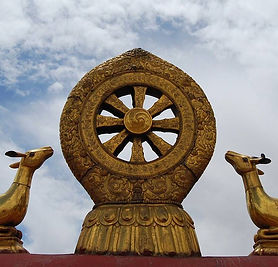
The Noble Eightfold Path
By Bhikkhu Bodhi
Paused
The Buddha's teachings center around two basic principles. One is the Four Noble Truths, in which the Buddha diagnoses the problem of suffering and indicates the treatment necessary to remedy this problem. The other is the Noble Eightfold Path, the practical discipline he prescribes to uproot and eliminate the deep underlying causes of suffering. The present book offers, in simple and clear language, a concise yet thorough explanation of the Eightfold Path. Basing himself solidly upon the Buddha's own words, the author examines each factor of the path to determine exactly what it implies in the way of practical training. Finally, in the concluding chapter, he shows how all eight factors of the path function in unison to bring about the realization of the Buddhist goal: enlightenment and liberation.
Favourite Quotes
.
Lesson
.

21 Lessons for the 21st Century
By Yuval Noah Harari
Paused
How can we protect ourselves from nuclear war, ecological cataclysms, and technological disruptions? What can we do about the epidemic of fake news or the threat of terrorism? What should we teach our children?
Favourite Quotes
"People are taught to believe in the story from early childhood. They hear it from their parents, their teachers, their neighbours and the general culture long before they develop the intellectual and emotional independence necessary to question and verify such stories. By the time their intellect matures, they are so heavily invested in the story that they are far more likely to use their intellect to rationalise the story than doubt it."
"When you inflict suffering on yourself in the name of some story, it gives you a choice: 'Either the story is true, or I am a gullible fool.' When you inflict suffering on others, you are also given a choice: 'Either the story is true, or I am a cruel villain.' And just as we don't want to admit we are fools, we also don't want to admit we are villains, so we prefer to believe that the story is true."
Lesson
.

1984
By George Orwell
Read
1984 revolves around the concept of omnipresent government surveillance, where Big Brother controls the society in the super-state, Oceania. Every aspect of life is closely monitored, every trace of privacy is rubbed off and the slightest hint of personal freedom or rebellion is ruthlessly quashed by the ‘thought police’.
Favourite Quotes
"They needed only to rise up... if they chose they could blow the party to pieces tomorrow morning. Surely sooner or later it must occur to them to do it? And yet!" P.57
"Why was it that they could never shout like that about anything that mattered?... Until they become conscious they will never rebel, and until after they have rebelled they cannot become conscious." P.58
"The capitalists owned everything in the world, and everyone else was their slave. They owned all the land, all the houses, all the factories, and all the money. If anyone disobeyed them they could throw them into prison, or they could take his job away and starve him to death." P.59
"She was very young, he thought, she still expected something from life, she did not understand that to push an inconvenient person over a cliff solves nothing." P.106
"In a way, the world-view of the Party imposed itself most successfully on people incapable of understanding it. They could be made to accept the most flagrant violations of reality because they never fully grasped the enormity of what was demanded of them, and were not sufficiently interested in public events to notice what was happening. By lack of understanding they remained sane. They simply swallowed everything, and what they swallowed did them no harm, because it left no residue behind, just as a grain of corn will pass undigested through the body of a bird." P.121
"For if leisure and security were enjoyed by all alike, the great mass of human beings who are normally stupefied by poverty would become literate and would learn to think for themselves; and when once they had done this, they would sooner or later realize that the privileged minority had no function, and they would sweep it away. In the long run, a hierarchical society was only possible on a basis of poverty and ignorance." P.147
"There are only four ways in which a ruling group can fall from power. Either it is conquered from without, or it governs so inefficiently that the masses are stirred to revolt, or it allows a strong and discontented Middle group to come into being, or it loses its own self-confidence and willingness to govern. The causes do not operate singly, and as a rule all four of them are present in some degree." P.159
"The masses never revolt of their own accord, and they never revolt merely because they are oppressed. Indeed, so long as they are not permitted to have standards of comparison, they never even become aware that they are oppressed." P.159
"We shall crush you down to the point from which there is no coming back. Things will happen to you from which you could not recover, if you lived a thousand years. Never again will you be capable of ordinary human feeling. Everything will be dead inside you. Never again will you be capable of love, or friendship, or joy of living, or laughter, or curiosity, or courage, or integrity. You will be hollow. We shall squeeze you empty, and then we shall fill you with ourselves." P.197
"It needed also a sort of athleticism of mind, an ability at one moment to make the most delicate use of logic and at the next be unconscious of the crudest logical errors." P.214
Lesson
.
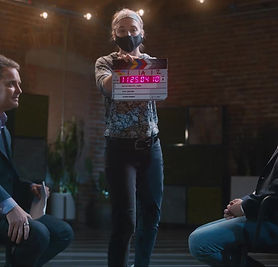
Art of the Cut: Conversations with Film and TV Editors
By Steve Hullfish
Paused
This book is a treasure trove of valuable tradecraft for aspiring editors and a prized resource for high-level working professionals. The book’s accessible language and great behind-the-scenes insight makes it a fascinating glimpse into the art of filmmaking for all fans of cinema.
Favourite Quote
.
Lesson
.
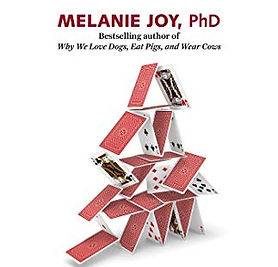
Powerarchy: Understanding the Psychology of Oppression for Social Transformation
By Melanie Joy, PhD
Read
Melanie Joy examines the metasystem, or overarching system, that informs all systems of oppression—such as racism, sexism, and carnism—and the psychology that enables it.
Favourite Quote
"When we look back on history, we can see that many of the beliefs we accept today as rational, ethical, and essential to a functional society were dismissed, invalidated, ridiculed, and even met with violent hostility."
"Social transformation is not about simply eliminating a particular behaviour; it is about transforming the system that gives rise to that behaviour in the first place."
"The metanarrative, or overarching narrative, of social powerarchies (and all powerarchies) is that there is a hierarchy of moral worth, that certain groups are more worthy of moral consideration than others.
"When people become aware not only of the consequences of a social powerarchy... but also of the cognitive distortions of the system, they may be better able to make choices that reflect what they authentically think and feel rather than what they've been conditioned to think and feel."
"One way to recognize powerarchical thinking in yourself is to ask yourself whether you're perceiving another as morally inferior and whether you're feeling the corresponding emotion of contempt."
Lesson
Oppression is a complex web of cognitive distortions, defence mechanisms, unhealthy ways of relating, and a belief in a hierarchy of moral worth that creates unjust power imbalances.
The path to power-with rather than power-over is one of awareness and letting go of powerarchical conditioning. An understanding of this web can bring one to practice empathy and compassion for others and brings attention to unrelational behaviours like perceiving others as morally inferior and feeling contempt.
The transformation of oppression comes from transforming the system that promotes oppressive behaviour. Personally, we should examine the way we relate with others and raise awareness of oppressive behaviours without shaming. We should hold others accountable while still treating them in a way that honours their dignity.

Being Nobody, Going Nowhere
By Ayya Khema
Read
Ayya Khema gives clear, practical instruction on meditation and techniques for overcoming counterproductive mental habits and beliefs.
Favourite Quote
"Make a balance sheet: 'How often have I felt lovingness towards another person today?" On the other side of the sheet put: 'How often have I felt anger, hurt, resentment, rejection, fear, anxiety today, when confronting other people?"
"Compassion is called for at all times, not only when tragedies have befallen people."
"It doesn't matter what they say, whether they are interested in you or whether they have any loving-kindness themselves. None of that counts. The only thing that matters is one's own heart, and that is the one thing to remember."
Lesson
An insightful guide demonstrating the tools required to understand oneself and ultimately end suffering.

Advertising Shits In Your Head: Strategies for Resistance
By Vyvian Raoul
Read
Advertising Shits in Your Head calls adverts what they are - a powerful means of control through manipulation - and highlights how people across the world are fighting back. It diagnoses the problem and offers practical tips for a DIY remedy.
Favourite Quote
"Considering the great hurdles we face socially and environmentally, the commercial discourse we surround ourselves with not only ignores our current reality but actively works against it by distracting us from each other in favour of ourselves."
"... the purpose and consequence seems to be the creation of a mood of restless dissatisfaction with what we have got and who we are so that we go out and buy more."
Lessons
Learning how a society of endless and destructive consumerism is perpetuated by the seemingly unmissable bombardment of advertisements.

The Philosopher and the Wolf
By Mark Rowlands
Read
Brenin exerted an immense influence on Rowlands as both a person, and, strangely enough, as a philosopher, leading him to re-evaluate his attitude to love, happiness, nature, and death.
Favourite Quote
"We humans fail to see the evil in the world because we are so distracted by shiny and twinkling motives that we don't notice the ugliness beneath them."
"The true moral test of humanity... lies in its relations to those who are at its mercy: the animals."
"Time heals, but it does so through erasure. This book is an attempt to record the lesson before it is gone."
Lesson
The importance of recording one's journey and extracting the lessons from experiences so that they are not forgotten.

The Picture of Dorian Gray
By Oscar Wilde
Read
Oscar Wilde's alluring novel of decadence and sin was a succès de scandale on publication. It follows Dorian Gray who, enthralled by his own exquisite portrait, exchanges his soul for eternal youth and beauty. Influenced by his friend Lord Henry Wotton, he is drawn into a corrupt double life, indulging his desires in secret while remaining a gentleman in the eyes of polite society. Only his portrait bears the traces of his depravity.
Favourite Quote
"There was a rather heavy bill for a chased silver Louis-Quinze toilet-set that he had not yet had the courage to send on to his guardians, who were extremely
old-fashioned people and did not realize that we live in an age when unnecessary
things are our only necessities"
Lesson
.

How to Win Friends and Influence People
By Dale Carnegie
Read
The core idea is that you can change other people's behavior simply by changing your own. It teaches you the principles to better understand people, become a more likable person, improve relationships, win others over, and influence behavior through leadership.
Favourite Quote
"The world is full of people who are grabbing and self-seeking. So the rare individual who unselfishly tries to serve others has an enormous advantage. He has little competition."
Lesson
.

Homo Deus: A Brief History of Tomorrow
By Yuval Noah Harari
Read
Homo Deus explores the projects, dreams, and nightmares that will shape the twenty-first century – from overcoming death to creating artificial life. It asks the fundamental questions: Where do we go from here? And how will we protect this fragile world from our own destructive powers? This is the next stage of evolution. This is Homo Deus.
Favourite Quote
"Fiction isn't bad. It is vital. Without commonly accepted stories about things like money, states or corporations, no complex human society can function. We can't play football unless everyone believes in the same made-up rules, and we can't enjoy the benefits of markets and courts without similar make-believe stories. But stories are just tools. They shouldn't become our goals or our yardsticks. When we forget that they are mere fiction, we lose touch with reality. Then we begin entire wars `to make a lot of money for the cooperation' or 'to protect the national interest'. Corporations, money and nations exist only in our imagination. We invented them to serve us; why do we find ourselves sacrificing our life in their service."
Lesson
.